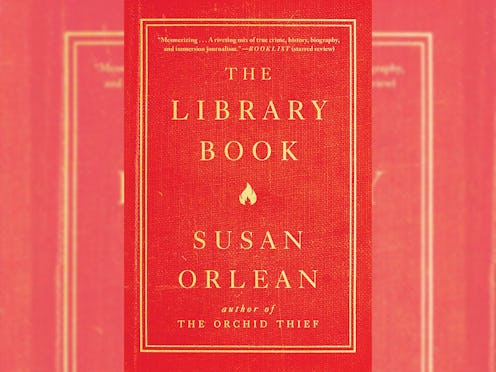Books
This Riveting New Book Is About The Arson That Nearly Destroyed The Los Angeles Public Library

It might seem odd to begin a story about loving books from a place of burning books, a story of loving libraries from a library engulfed in flames — but that’s exactly what journalist and author Susan Orlean has done in her most recent title, The Library Book, out from Simon & Schuster on Oct. 16. Orlean, the author of The Orchid Thief and Rin Tin Tin, has made a career out of writing about the strange, the random, the obscure — diving into topics you wouldn’t imagine could fill an entire book, and making them utterly captivating. But in her newest book, she tackles a subject familiar to practically everyone: the American public library. In fact, it’s already being called a love letter to libraries. It’s also, in many ways, a love letter to books. And yeah, you’ll love it.
The Library Book rotates around the April 29, 1986 fire at the Los Angeles Public Library — an event that left 22 people injured and burned 400,000 books and other materials; damaging 700,000 more. Orlean describes it as the “perfect fire," chemically speaking, at least. Reaching 2500 degrees and burning for more than seven hours, the fire sparked at a moment when it had the exact amount of air needed to totally consume everything — conditions almost impossible to create outside of a lab. The water from the firefighters' hoses boiled. At the end of it all, over a foot of book ash was left on the floor. It would take years to replace the replaceable, and the irreplaceable never would be. It was the single most destructive library fire in American history. Investigators determined the fire was man-made, and Los Angeles police pinpointed the arson suspect. In researching, Orlean herself burns a book (fittingly, Fahrenheit 451) in order to put herself inside the mind of someone who might burn a book — someone who might set fire to an entire library.
And yet, The Library Book isn’t actually about any of this at all.
The Library Book by Susan Orlean, $28, Amazon or Indiebound
“I grew up in libraries, or at least it feels that way.” Orlean writes, in the early pages of the book. “My mother always mentioned that if she could have chosen any profession at all, she would have chosen to be a librarian.” At times it seems like The Library Book, if written as a love letter to libraries, was written for Orlean’s mother as well — a book lover who raised a book lover who would grow up to write books of her own. “I could have anything I wanted in the library,” Orlean explains. Yes. Same. The reading world, very likely, can be divided into two groups: those who remember the feel, sound, smell of mylar library book covers and those who don’t.
Orlean takes readers on a tour of the stacks of the library of her childhood, as well as those of the Los Angeles Public Library. She alternates between guiding readers through the events of and immediately following the library fire — what it was like to be a firefighter in the building that day; the experience of the library staff and patrons who stood outside, watching the library burn; the investigation into and arrest of Harry Peak, a struggling actor whose role in the fire remains a mystery — and interrogating the role that libraries play in our modern lives and our cultural narrative.
Contrary to the noise we’ve come to associate libraries with (aka: silence) in The Library Book, libraries are loud. In fact, they rumble. She describes not just the footsteps and voices and general hum of any place where people gather, but the actual noises of the books themselves: as their pages turn and their covers shut, as they’re pulled from and slid back into shelves, as they’re stacked one on top of the other, as they’re rolled between the stacks on ancient metal book carts. She describes the way libraries have become more like town squares than book repositories: the social services they offer, the free gathering spaces they provide, their role as a daytime waystation for a city’s homeless and jobless. Unbelievably, especially in this age of the great Google, people under 30-years-old use libraries in greater numbers than anyone else, assuaging any worries one might have that the world’s libraries are on the verge of becoming obsolete, like, say, video stores and indoor malls.
The Los Angeles Public Library itself was repaired. It's still there, with a circulation of 18 million books, standing at 630 West 5th Street in the heart of downtown LA, where it has been standing for nearly 150 years. No worse for wear (and perhaps a bit better, depending on who you ask) it was restored by employees and volunteers and the city of Los Angeles itself.
“In the library, time is damned up — not just stopped, but saved,” Orlean writes. “The library is a gathering pool of narratives and of the people who come to find them. It is where we can glimpse immortality; in the library, we can live forever.” And, as The Library Book demonstrates, not only can we live forever — in a way — in libraries, but libraries, in their modern function and evolution, can live forever too.